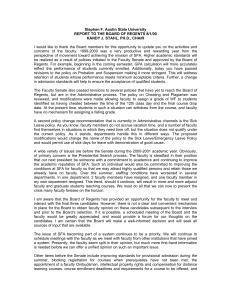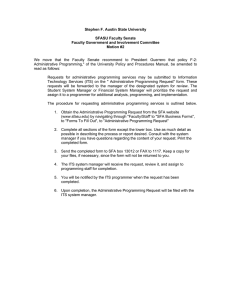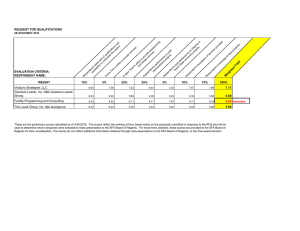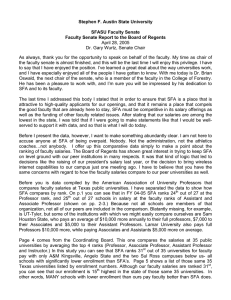Faculty chairman tells regents SFA salaries "dangerously low"
advertisement
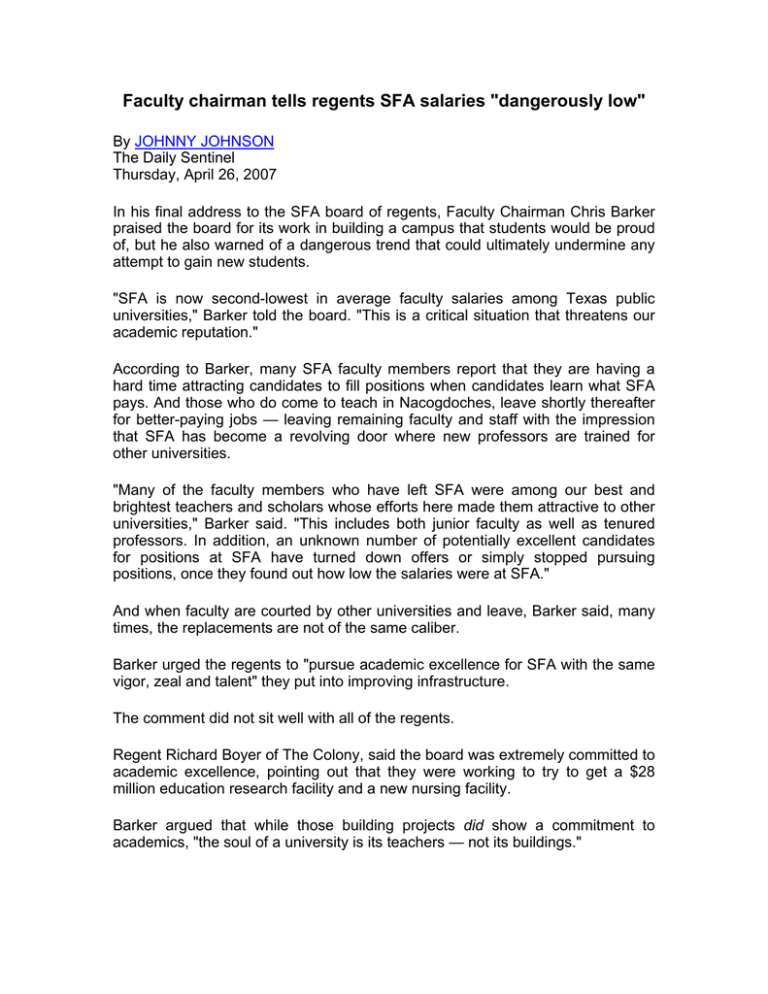
Faculty chairman tells regents SFA salaries "dangerously low" By JOHNNY JOHNSON The Daily Sentinel Thursday, April 26, 2007 In his final address to the SFA board of regents, Faculty Chairman Chris Barker praised the board for its work in building a campus that students would be proud of, but he also warned of a dangerous trend that could ultimately undermine any attempt to gain new students. "SFA is now second-lowest in average faculty salaries among Texas public universities," Barker told the board. "This is a critical situation that threatens our academic reputation." According to Barker, many SFA faculty members report that they are having a hard time attracting candidates to fill positions when candidates learn what SFA pays. And those who do come to teach in Nacogdoches, leave shortly thereafter for better-paying jobs — leaving remaining faculty and staff with the impression that SFA has become a revolving door where new professors are trained for other universities. "Many of the faculty members who have left SFA were among our best and brightest teachers and scholars whose efforts here made them attractive to other universities," Barker said. "This includes both junior faculty as well as tenured professors. In addition, an unknown number of potentially excellent candidates for positions at SFA have turned down offers or simply stopped pursuing positions, once they found out how low the salaries were at SFA." And when faculty are courted by other universities and leave, Barker said, many times, the replacements are not of the same caliber. Barker urged the regents to "pursue academic excellence for SFA with the same vigor, zeal and talent" they put into improving infrastructure. The comment did not sit well with all of the regents. Regent Richard Boyer of The Colony, said the board was extremely committed to academic excellence, pointing out that they were working to try to get a $28 million education research facility and a new nursing facility. Barker argued that while those building projects did show a commitment to academics, "the soul of a university is its teachers — not its buildings." Kenneth James, outgoing regent from Kingwood, asked what the climate was among SFA faculty and how they perceived the actions of the board. "Do they see our efforts as giving us the ability to raise enrollment, which will, in turn, raise salaries?" James asked. Barker said he would hope that faculty understood that the board was trying to address the issue by increasing enrollment, but in reality, many faculty members did not see it that way. "I think the situation with salaries is overwhelming everything else," he said. "We're getting turned down by good candidates because our salaries are where they are." Nacogdoches Regent Joe Max Green told Barker that the board realizes the problem, that regents do not want SFA to be "next to the bottom" on anything. Green said regents are "highly interested" in seeing that faculty are paid adequately. "We'll see what we can do to correct this," Green said. "But it's not going to happen overnight." Boyer also pointed out that many of the examples of teachers leaving, cited in Barker's report, included faculty and staff who were leaving for larger institutions, and that it made sense that larger institutions could offer larger salaries. Barker said there were many instances where faculty left for jobs with lower teaching loads — which mean the faculty members would be able to and expected to produce more research, which some professors found desirable. Barker supplied regents the following responses from existing teachers and department heads about the effect of low salaries during the past three years: ------------------------Responses from the College of Science and Mathematics * Last year we lost one of our most productive faculty members to Baylor. He left with an increase of $12,000-plus and a six-hour teaching load. * Last year we lost our top candidate to fill an assistant professor position to Sam Houston. At SHSU, the teaching load is nine hours for faculty (in our discipline) with a significantly higher entry level salary. * Last year, two people on our short list asked their names to be removed when they were informed of the entry level salary. * We were able to hire one excellent candidate who was also considering SHSU. The only reason was that his wife refused to live in Huntsville because of the prison there. * (Our department) was turned down four times over the last four years (by job candidates) while searching for three positions. Twice, our No. 1 and No. 2 candidates turned us down. Money is a big issue because in (our) field postdocs are being offered salaries for the same amount that we are offering for tenure track positions. The other problem we have is startup money (i.e., money to set up a lab and buy equipment for research). While we offered none, other places offer $25,000 to $1 million. * Nationwide demand for qualified candidates to fill positions (in our discipline) make the market for individuals highly competitive. Increased demand for faculty (to teach service courses) for pre-nursing, nursing and pre-health professions schools will continue well into the foreseeable future. The relative low salaries offered at SFA will not allow for competitive offers to teach in this area. * Resignation of seven assistant professors, all for better pay ranging from $8,000 to $22,000 more. * Three failed searches for junior faculty due to low salaries and lack of qualified applicants. * Failed search for department chair due to lower salary than requested by applicant. * We hired a new faculty member this year but had to offer a starting salary that was about $7,000 above the original planned salary because otherwise the search would have failed. Several of the candidates said that they would not consider the position for less. * We had an industry service company representative visit our department on a recruiting trip this semester, and his company was offering starting salaries to students with bachelor’s degrees that were the same or higher than what SFA is offering to pay new PhDs. * One of our master's students is about to graduate and has accepted a position with a starting salary that is higher than I am making as chair of the department. ------------------------- Responses from the College of Liberal and Applied Arts * Typically it is difficult for an academic couple to find employment at the same institution. It is even more difficult if they are in the same department. We hired a couple thinking it would solve our incredibly high turnover problem. Nope. James Madison University recruited them at a higher salary (about $8,000 if I remember correctly). We subsequently shut down (one of) our master's programs and the teaching emphasis, both of which produced highly marketable individuals. I'd like to add here that when we hired them two years prior to their departure, it was our third attempt. The two previous searches failed due to salary. * We cannot focus solely on starting salaries with respect to new hires. This one requires an example to explain. For new hires in the College of Liberal and Applied Arts who begin Sept. 7, 2001, the starting salary will be $43,000. That's too low to begin with, but it creates a problem in-house. Faculty who joined us this year got a starting salary of $40,000. Those hired the previous year have likely not reached $43,000 or may have slightly exceeded it. What about their salaries? We cannot perpetuate and exacerbate the salary compression problem that exists on this campus. * This year we're losing three junior faculty, all of whom have received higher paying jobs in tenure-track positions with lower teaching loads. * We also lost our most published senior faculty member two years ago to an endowed chair position (1-1 teaching load) at the University of Indiana-Purdue at Fort Wayne. This professor had begged the former dean of liberal arts for higher pay but was denied. He said he had grown to love Nacogdoches and did not want to leave, but he felt he was simply undercompensated and after 12 years at SFA he had finally had enough of the low pay. He had published at least three books and several articles prior to leaving. * We also lost another senior faculty member to a deanship at a community college in the Chicago area. She also felt she was under-compensated. * We have lost several other junior faculty for a variety of reasons, but low pay and the teaching load ... were definitely major issues for those who have left. * Here is a letter of departure from a professor who left our department: "Dear colleagues and friends, as the poet says, were there world enough and time I would have told you all individually that I will be leaving SFA after the conclusion of the spring semester to take a position (elsewhere). My reasons for leaving are few though significant as most of you can appreciate. The university sent a clear message to us as a faculty that it does not prioritize scholarship and academics as highly as, say, baseball and landscaping, and I am afraid that the only efficacious way of responding in kind is to resign. Politics aside, I have enjoyed your friendship and support and admire and respect all of you... " * This spring we offered a position (assistant professor, tenure track) to a highly qualified candidate. Although the candidate stated that she found many aspects of the department attractive, she was accepted a position in Maryland which offered her: 1) a lighter teaching load, 2) $11,000 more than we were offering, 3) paying all her moving expenses, as opposed to the $1,000 we were able to offer (split between the dean's office and the department). ------------------------Responses from the College of Business * (One of our professors) was lured away to Texas State San Marcos with the offer of teaching fewer hours and a salary increase of $26,000. * (We) offered a candidate a tenure track position with a salary of $90,000, and she turned us down to go to Baylor for $110,000 as a visiting professor! * Several of the (our) applicants have withdrawn their name from consideration when they found that the position here pays less than what they are already making. * Nationwide there is a shortage of professors (in our field) with no relief in sight. With the current age of our faculty, I am very worried about being able to replace the faculty with qualified individuals! * We at SFA in (our department) are in the lowest quartile (25 percent) in terms of salary. * This is not anecdotal evidence, it is cold hard facts that I as chair would have to face, if I had to search for a faculty member in the various disciplines housed within this department. ------------------------Responses from the College of Fine Arts * Last year we lost an outstanding junior professor: She took a position at a university in Michigan where the salary was more than $10,000 higher than at SFA and the teaching load was 3/2 (i.e., significantly less than at SFA, giving her the opportunity to pursue more research). ------------------------- Responses from the College of Forestry * I cannot think of a single faculty member who has left because of salary issues nor have we experienced any problems with hiring viable candidates. * We do have some salary issues related to younger faculty making almost as much or more than faculty who have been here for some time. The lack of timely and substantive raises for many years is a concern; new hires are often brought in at relatively high salaries, because we have to pay that high to attract them. I think everyone on our faculty is underpaid based on the teaching, research and extension duties we ask of them... Find this article at: http://www.dailysentinel.com/news/content/news/stories/2007/04/27/faculty_salaries.html
